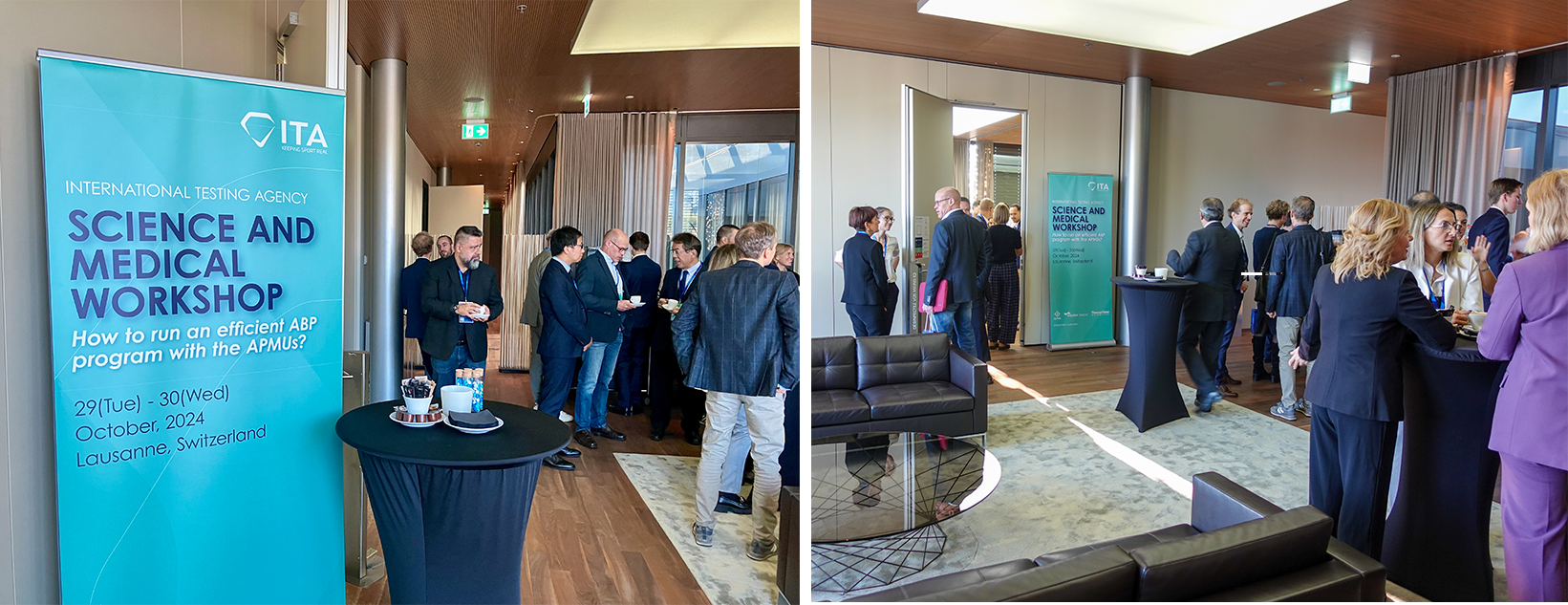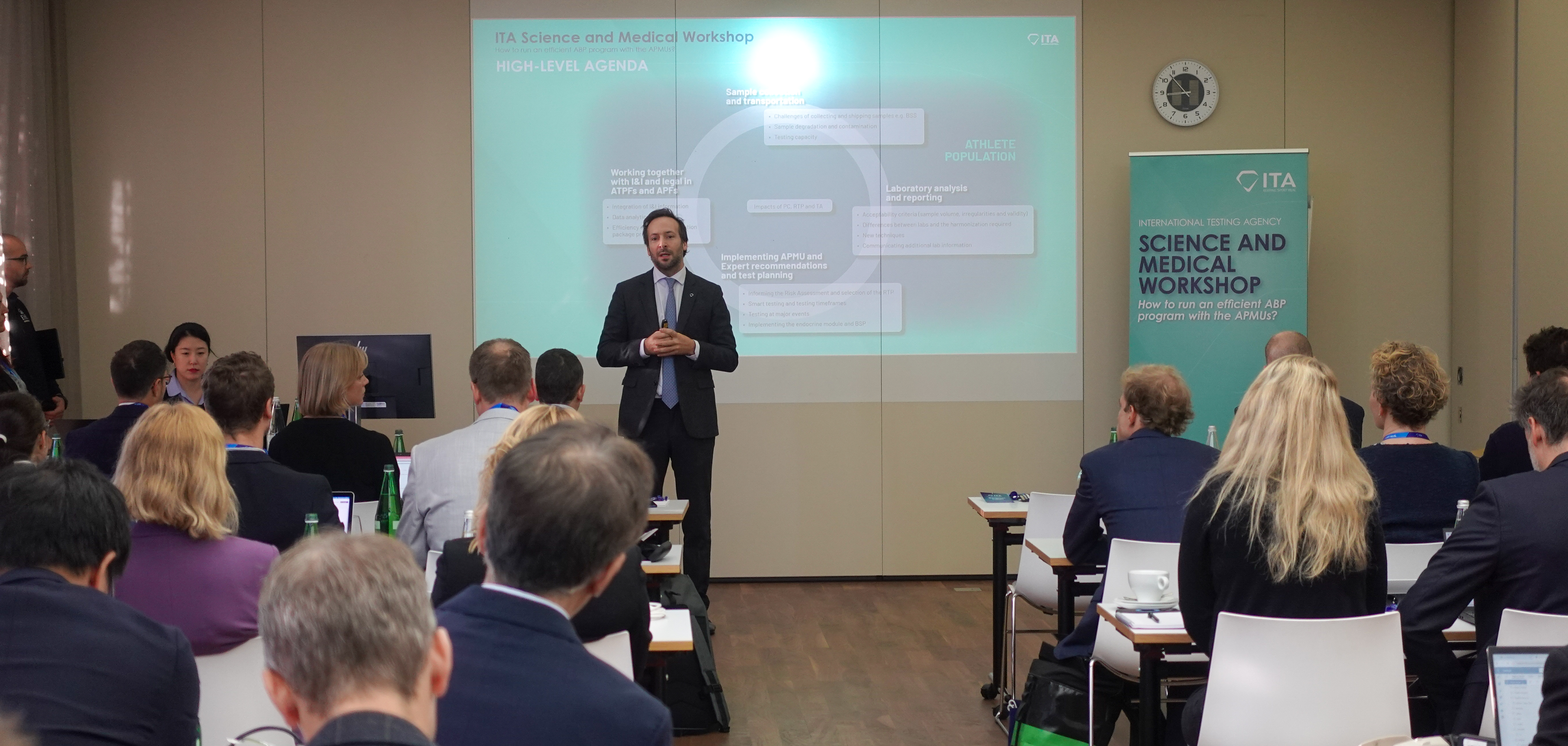Menu
 Back
Back
13 November 2024
Hosted in Lausanne, Switzerland, from October 29–30, 2024, this first ITA Science and Medical Workshop gathered 62 international anti-doping experts and scientists to focus on the Athlete Biological Passport (ABP). This program, designed to monitor biological markers in athletes over time, is a powerful tool in the fight against doping. The workshop emphasised that implementing such a sophisticated program requires extensive collaboration, individualised approaches, and ongoing innovation.
Under the title ITA Science and Medical Workshop – How to Run an Efficient ABP Program with the Athlete Passport Management Units (APMUs), the event opened with contributions from athlete representatives Nikki Hamblin, Olympic middle-distance runner, and Sara Mihalik, kayaking world champion. Participants were reminded of the raison d’être of the anti-doping system: to ensure that anti-doping practices are fundamentally athlete-centred. They also highlighted that athletes’ diverse backgrounds, varying levels of educational support, and differing access to resources across sports should be considered when implementing ABP programs.
Running an Athlete Biological Passport (ABP) program requires significant resources. During the workshop, experts discussed the potential for tailored ABP programs that consider each sport’s unique requirements and budgets. Effective allocation of resources would allow ABP programs to operate where needed and enable more efficient distribution within a sport’s anti-doping program.
Further essential discussions addressed logistical challenges, such as cross-border regulations for biological samples and the transport and handling of samples. Ensuring strict adherence to handling protocols, improving communication between Testing Authorities and Sample Collection Agencies (SCAs), and sharing laboratory capacity information across anti-doping organisations were identified as critical steps to streamline ABP operations.
Technological advancements and data management upgrades emerged as major focus areas, including progress toward enhanced detection of blood manipulation. Another session addressed how to use laboratory data to inform targeted testing of athletes. Improving communication channels and standardising data in ADAMS (Anti-Doping Administration and Management System) were recognised as valuable steps to enhance collaboration among ABP stakeholders. The workshop also explored the potential for ABP data to contribute to risk assessments for determining an individual athlete’s likelihood of doping.
In a role-play scenario, participants examined the effects of incorporating intelligence and investigative data into an ABP case. Such exercises were designed to broaden perspectives on the various aspects of ABP operations.

“The ITA Science and Medical Workshop was developed with a round table in mind to bring together the concentrated expertise of ABP specialists for face-to-face exchanges and in-depth discussions. A situation that rarely happens as experts and laboratories are spread across the world”, said ITA Head of Science and Medical Neil Robinson. “Next to discussing present challenges and sharing best practices we also took the opportunity to take a step back with our participants. To look through the eyes of an athlete, a lawyer, an investigator and to critically analyse processes with gained perspective, identify potentials and discuss solutions.”
ITA Director General Benjamin Cohen added: “We would like to extend our gratitude to all participants of the first ITA Science and Medical Workshop for their invaluable contributions that shaped this event’s success. The Athlete Biological Passport (ABP) is an integral tool we must continue leveraging in our shared mission of ensuring athletes a level playing field. While we are excited that this workshop sparked new ideas around the ABP program and testing practices, we also look forward to continuing the conversations with all stakeholders and strengthen the powerful tools in place for a joint approach to clean sport.”
Over two days, this diverse group of experts—including representatives from World Anti-Doping Agency (WADA) accredited laboratories, the World Association of Anti-Doping Scientists (WAADS), Athlete Passport Management Units (APMUs), a sample collection agency, industry representatives, WADA staff, and ITA members from various departments—engaged in open and honest dialogue. During and between presentations, participants appreciated the opportunity to share their knowledge and experiences, creating a stimulating environment where existing assumptions were challenged and new perspectives explored.
The ITA Science and Medical Workshop was supported by sponsorships from IDTM, Sysmex and Thermo Fisher Scientific.
